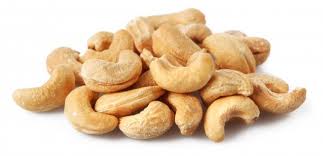Showing posts with label minerals. Show all posts
Showing posts with label minerals. Show all posts
Saturday, February 22, 2014
Health Benefits Vitamins and Minerals in Cashews

Cashews provide your body with valuable nutrients, including vitamins and minerals that lead to many health benefits. The levels of protein, healthy fats and low glycemic carbohydrates found in the nut help with some of the most basic, but necessary bodily functions.Cashew nuts, or cashews, make an excellent between meal snacks and are also delicious as nut butter or thrown into stir-fries and Asian dishes. They also make a delicious creamy sauce used in Indian curries. The health benefits of cashew nuts include heart disease prevention, bone health, antioxidant protection and energy production.
Health Benefits of Cashews
- Cashews are rich in magnesium and copper, both of which are necessary for healthy bones. Magnesium also helps with the absorption of calcium into bones.
- The large amount of monounsaturated fats found in a serving size of cashews help to improve and maintain good heart health.
- One of the most helpful nutrients found in cashews, folate, largely helps your body maintain an overall healthy system.
- Contrary to the popular belief that regular consumption of cashew nuts can lead to weight gain, recent studies have indicated that such theories and misconceptions are groundless. In fact, people who consume cashews twice a week are less likely to gain weight as compared to the ones that never eat them.
- One ounce of raw, unsalted cashew nuts contains 0.94 grams of fiber.
Calories - 157
Minerals Contained
- Potassium - 187 mg
- Phosphorus - 168 mg
- Calcium - 10 mg
- Magnesium - 83 mg
- Iron - 1.89 mg
- Sodium - 3 mg
- Manganese - 0.469 mg
- Zinc - 1.64 mg
- Copper - 0.622 mg
- Selenium - 5.6 mcg
- Also contains trace amounts of other minerals.
- Vitamin C - 0.1 mg
- Vitamin B1 (thiamine) - 0.12 mg
- Vitamin B2 (riboflavin) - 0.016 mg
- Niacin - 0.301 mg
- Pantothenic Acid - 0.245 mg
- Vitamin B6 - 0.118 mg
- Folate - 7 mcg
- Vitamin E - 0.26 mg
- Vitamin K - 9.7 mcg
- Contains some other vitamins in small amounts.
Thursday, February 20, 2014
Health Benefits Vitamins and Minerals in Watermelon

Health Benefits of Watermelon
- Rich in electrolytes and water content, melons are nature’s gift to beat tropical summer thirst.
- Watermelons are very low in calories (just 30 cal per 100 g) and fats yet very rich source of numerous health promoting phyto-nutrients and anti-oxidants that are essential for optimum health.
- Watermelon is an excellent source of Vitamin-A, which is a powerful natural anti-oxidant. It is essential for vision and immunity. Vitamin-A is also required for maintaining healthy mucus membranes and skin. Consumption of natural fruits rich in vitamin-A is known to protect from lung and oral cavity cancers.
- Watermelon fruit is a good source of potassium; Potassium is an important component of cell and body fluids that helps controlling heart rate and blood pressure; thus offers protection against stroke and coronary heart diseases.
- One medium wedge (slice) of watermelon (about 2 cups edible portion) contains 1.1 grams of dietary fiber.
Calories - 86
Nutrition In Watermelon
Minerals Contained
- Potassium - 320 mg
- Phosphorus - 31 mg
- Magnesium - 29 mg
- Calcium - 20 mg
- Sodium - 3 mg
- Iron - 0.69 mg
- Selenium 1.1 mcg
- Manganese - 0.109 mg
- Copper - 0.12 mg
- Zinc - 0.29 mg
- Also contains small amounts of other minerals.
- Vitamin A - 1627 IU
- Vitamin B1 (thiamine) - 0.094 mg
- Vitamin B2 (riboflavin) - 0.06 mg
- Niacin - 0.509 mg
- Folate - 9 mcg
- Pantothenic Acid - 0.632 mg
- Vitamin B6 - 0.129 mg
- Vitamin C - 23.2 mg
- Vitamin E - 0.14 mg
- Vitamin K - 0.3 mcg
- Contains some other vitamins in small amounts.
Subscribe to:
Posts (Atom)